Many self-managing homeowners expect that once they find a renter, they can simply collect a check every month without worries.
Unfortunately, this isn’t the reality for most of them.
We recently conducted a survey where homeowners identified the pain points of self-managing their rental properties.
Here’s what we found. We’re also sharing some tips on how you can resolve each of them.
Property Maintenance
The survey showed that 94.2% of the homeowners worry most about Property Maintenance and we’re not surprised. One of the main reasons homeowners call Poplar Homes is to help them manage maintenance issues during the tenancy period. Property concierge roles such as answering calls or emails for maintenance requests are a top concern for 45% of the owners. It takes too much of their time and can be difficult for those with full-time jobs or other priorities. See more results below.
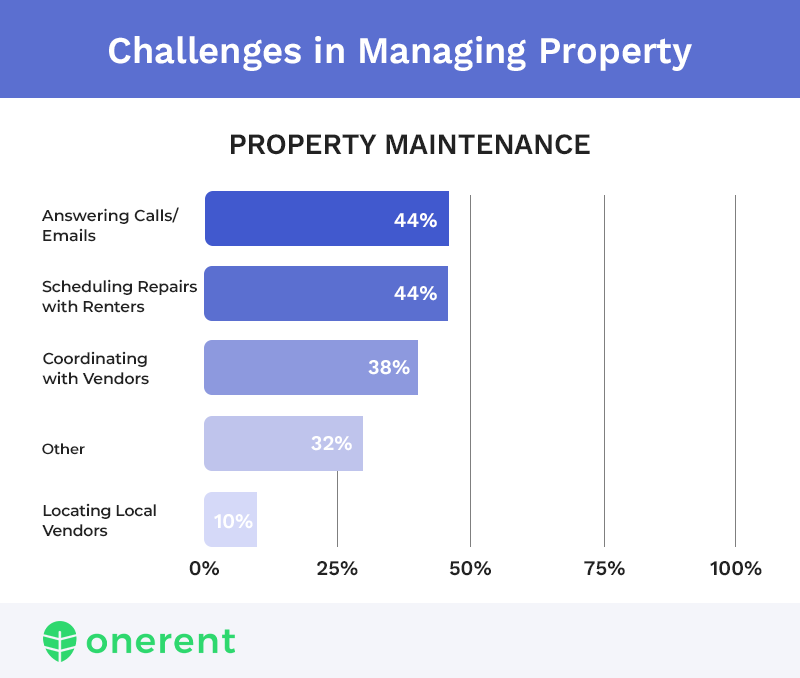
Here are some tips on how you can address or avoid these problems in the future.
- Help renters troubleshoot issues first. We help renters troubleshoot issues by giving them how-to videos or instructions over call, saving owners from expenses. You can easily replicate this!
- Limit unwanted maintenance calls. State in the lease agreement that your renter should call you about maintenance requests during business hours (unless it’s an emergency). Provide a list of repairs that are considered high priority, medium priority, and low priority.
- Think long-term. Think of ways to keep your renters long-term. Find ways to make your property livable, even if it means investing in year-long renovations. Properties in mint condition needless repairs and will keep renters comfortable. Rental properties are an investment; make sure yours is booming.
- Engage with a professional network of qualified vendors. Finding qualified vendors is often a difficult task. You can work closely with a professional network or your homeowners’ association for referrals. You can also approach property owners at association events to get recommendations.
Managing Renters
From setting rules to dealing with violations on the property, managing renters can take up a lengthy amount of time. Based on our survey, 45% think addressing renter violations takes up most of a homeowner’s time. See what other pain points homeowners have with regard to managing renters.
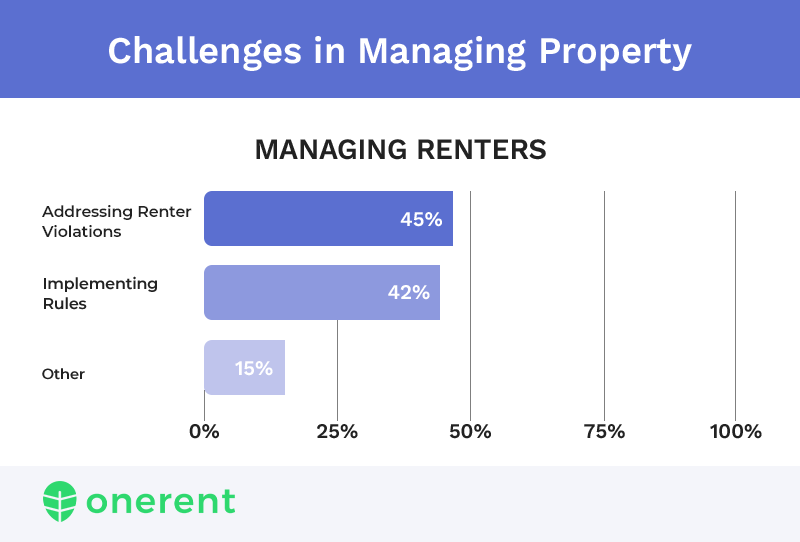
So what can you do about these issues? We’ve got a couple of suggestions:
- Send your renters a notice with specific violation details. If your renters violate the lease, you can provide them with a notice. Research your state’s laws on how you can serve the notice. When you do this, be sure to specify your renter’s violations instead of providing a broad classification.
- Craft clear and specific lease agreements. Don’t just settle for a template lease agreement. A clear and specific lease agreement can help you protect your property and your right as a property owner. Ensure that you listed down all specifics, especially for matters regarding rent collection, maintenance and repairs, and property rules.
Leasing Negotiation
Our survey shows 48% agree that negotiating lease terms is largely time-consuming. This is because crafting a lease property owners and their potential renters can both agree on depends on how each defines the terms.
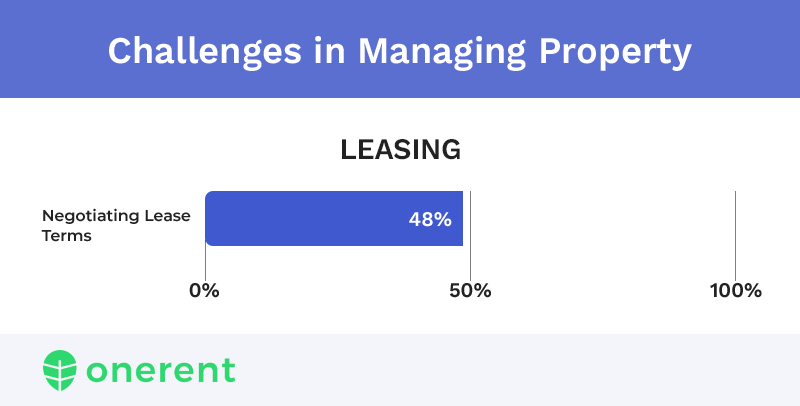
We’ve rounded up some things you can do to address this pain point:
- Be open to changes. Decide which terms of the lease you can put on the table for discussion. For instance, you could be flexible with allowing pets but not with adjusting rent. It can also help to research reasonable rates, especially when discussing fees.
- Provide clear move-in documentation. This documentation will record the actual condition of the property before the renter moves in. This will serve as a guide to your property for future renters. It is vital that you make sure your unit is habitable and up to code during this inspection.
Rent Collection
This is one of the more dreaded tasks homeowners face, especially when dealing with a non-compliant renter. According to our survey, 42% agree that following up on late payments takes up the most time. Look what else we found.
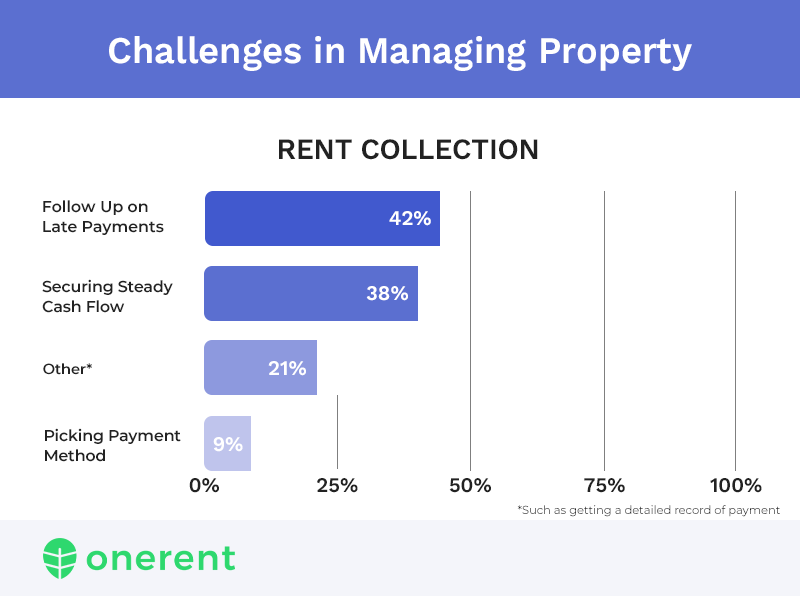
Here are some tips for collecting rent:
- Explain the consequences of late rent payments. Homeowners dread late rent payments and follow-ups. One of the best strategies you can employ is to add late fees on top of the rental fees to motivate your renters to pay on time. You can specify this in the lease agreement.
- Remind your renters of rent collection. Make sure to send the reminder at least a few days before the due date. Send them a reminder through email, text message, phone call, or any other medium you both agreed to reach them through. Reminding renters of their dues can help you secure steady cash flow and avoid accumulating costs like back rent.
- Use e-payment methods. Electronic payments make recording transactions easier for you and your renters. It also ensures you have proof of every payment from your renter. More importantly, e-payments are foolproof so even if renters claim to have paid ahead, you can show them the record.
Protecting Property from Damage
Every property is at risk of damage, but the stakes are different depending on the lease agreement, maintenance of the unit, and how well the renter takes care of your property. Our survey shows 44% believe that determining security deposit deductions eats a huge chunk of their time. Here’s what we’ve found:
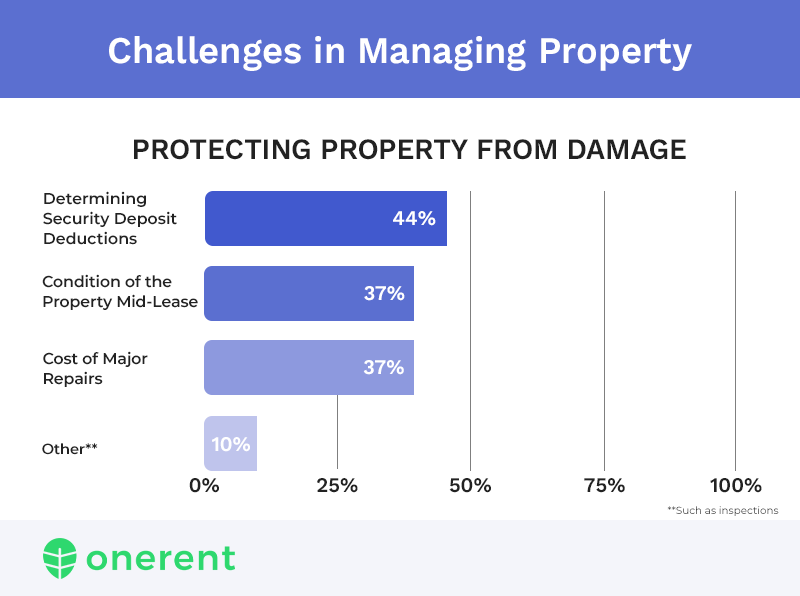
What can you do about this?
- Collect a security deposit. A security deposit secures your renter if damage occurs. The great thing about this is that renters will take better care of your property when they know their money is involved. Security deposits are used for damage repair, key replacement, or back rent.
- Research state laws regarding security deposits. The security deposit should be returned to the renter in full when he or she moves out—unless the renter owes you money or caused serious property damage. We recommend researching your state’s laws regarding this. In California, the homeowner must return the security deposit within 21 days of move-out.
- Include the frequency of inspections in the lease. Keeping an eye on the state of your property mid-lease can be tricky, but you can still find a way around it. Specify in the lease agreement how often you have to inspect the property. Once, twice, or thrice a year will be good enough, particularly for maintenance checks.
Risk of Evictions
Everyone wants to avoid the risk of eviction whether they’re a homeowner or a renter. When the risk of eviction arises, other problems also arise. Our survey found that the legal process and costs associated with an eviction are two of the most common pain points when it comes to eviction. See what other problems they found time-consuming below:
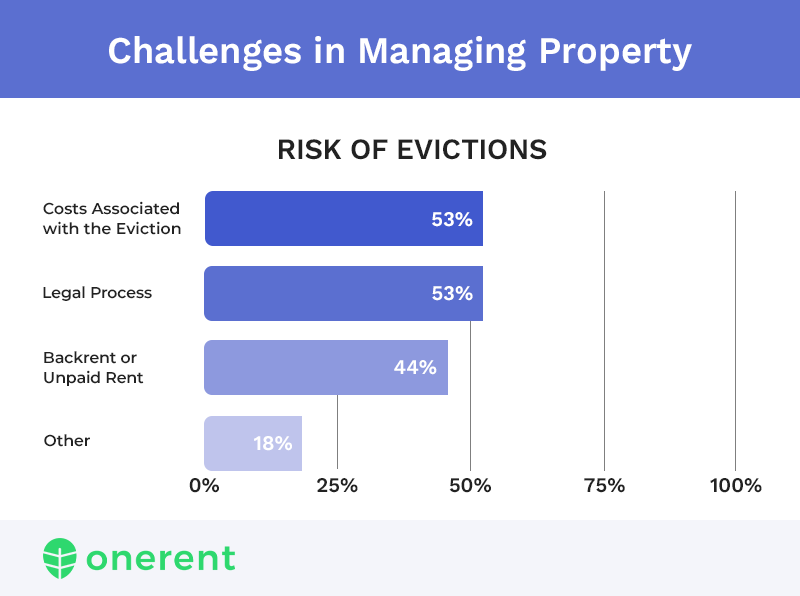
So what can you do about it?
- Keep a record of unpaid dues. Having proof of unpaid rent to present to your renter—or in the worst case, in court—will be helpful in settling the matter.
- Meet with your renter. Discuss serious matters with your renter in person. Have a one-on-one discussion and find ways to resolve issues. This can be better than spending a lot of time on an eviction case. This meeting can also be an opportunity for you to see if your renter is serious about doing business with you or can be worth a long-term stay.
- Gather all recorded data for proof. Following up on unpaid rent is a pain, but when it’s time to confront your renter on his or her dues, it helps to have proof. Documentation such as screenshots of emails or e-payment records can help serve as evidence of non-payment.
Conclusion
Keeping tabs on your rental properties is tough. Based on the many tasks you need to undertake, being a homeowner is a full-time job.
Between negotiating the terms of your lease, ensuring your renters’ comfort, collecting rent, and everything else, a homeowner’s tasks can get quite overwhelming.
Hiring a property management company like Poplar that offers property management services such as marketing your property, tenant screening, rent collection, maintenance, and many more can certainly take the burden off your shoulders.
We’ll take care of all your rental needs such as marketing your listing, screening qualified renters, preparing the lease, following up on prospects, and coordinating the move-in.
We’ll also handle maintenance calls, find vetted and insured vendors, and perform annual move-in or move-out inspections. To protect you from risks, we provide rent guarantee and eviction coverage.
In light of the Government’s moratorium in response to the Covid-19 health situation, we are freezing the Rent Guarantee feature until it’s legal for us to collect or pursue rent.
With all the benefits you can enjoy, we also charge less than the industry standard. At the right price, you can focus on doing the things you love while we manage your property like it’s our own.
Remember, there’s always a better way to manage your rental properties. Let Poplar help you get started.
Recent Comments